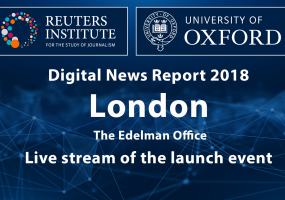Great diversity in news habits and trends across the European Union
On the eve of European Union elections, we looked at some of the major issues surrounding the news media across 20 EU countries in our 2018 Digital News Report: levels of trust, concern over misinformation, social media use for news and news avoidance (from the 2017 report). How users access news, and how much they trust what they read, will feed into voters' decision making processes and, as ever, concerns around misinformation surround the poll, whether or not it can actually sway the result.
We find that even within a bloc of countries which are largely wealthy, stable democracies with pluralistic news environments there is a wide range of responses to our survey questions from one country to the next. For instance, the proportion of people who say they actively avoid news in Greece (57%) is over four times the proportion in Denmark (14%). If people are avoiding news in order to avoid 'bad' news, it is likely that such a measurement will be volatile from country to country and from year to year depending on the major news stories occurring at any given time. Greece has been at the forefront of many crises to hit Europe over the past few years including a severe economic shock, and the refugee crisis.
In 2017, the level of news avoidance in the UK was relatively low, at 24%. This year, in the run up to the EU elections, the biggest news story has been the EU itself, or more specifically the campaign to take the UK out of it. Has the rise of the Brexit Party, which has led opinion polls, become an issue that news audiences want to engage with, or is a potential electoral defeat for the established parties symptomatic of voter fatigue and a tiring news audience that just wants the government 'to get on with it'? Perhaps our forthcoming Digital News Report (published 12 June), which includes this measure, will shed some light on this.
Our surveys also find that news audiences concerned with misinformation can also be the most trusting of the media - Portugal has the highest levels on both counts. This could be explained by savvy news audiences able to tell the difference between serious journalism and misinformation, and diligent news media doing its job well to inform its readers. However, as we see in France, concern over misinformation (the country is ranked 4th out of 20 on this measurement) can go hand-in-hand with mistrust in journalism (France is ranked 5th from bottom in levels of trust). If the news media are viewed as complicit in not giving their readers an accurate picture then they can become seen as part of the misinformation problem rather than as something separate. Heightened awareness of misinformation may also translate into concern over it; it should be noted that President Emmanuel Macron's vow to combat 'fake news' was announced in January 2018, just before our survey was carried out. It will be interesting to learn whether the recent Gilets Jaunes protests and Notre Dame Cathedral fire - both of which led to concerns over misinformation - have had an effect on trust in the news media in general.
How news audiences across the EU view and interact with their media in vastly different ways points to the complexities present in each country: what the big news events are in each country, how their news media environments are structured, and what efforts are being taken at a political and industry level to address misinformation. Issues like these - and countless more not covered here but which form our Digital News Report - inevitably feed in to audience behaviour and potentially the decisions of that audience when they come to vote.




